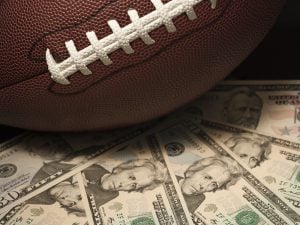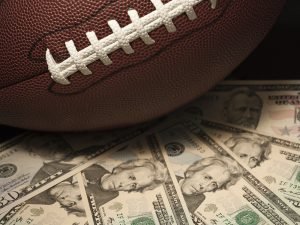
What would the perfect national college athlete name, image, and likeness bill look like? I have gone through each of the currently proposed bills sponsored by members of Congress and cherry-picked the provisions that make the most sense for a precise, concise piece of legislation that I believe Democrats and Republicans should come together to ensure that all college athletes across the U.S. are afforded the ability to exploit their publicity rights sooner rather than later.
- The actual prohibition on restricting college athletes’ commercial exploitation of their names, images, and likenesses should be taken from The College Athlete Economic Freedom Act, authored by Sen. Chris Murphy and Rep. Lori Trahan. It states, “An institution of higher education or intercollegiate athletic association may not enact or enforce any rule, requirement, standard, or other limitation that prevents college athletes or prospective college athletes, individually or as a group, from marketing the use of their names, images, likenesses, and athletic reputations.” This would ensure that athletes, no matter their age or whether they are even enrolled in college, have the capacity to earn money from their publicity rights.
- Sticking with the bill authored by Murphy and Trahan, there should be an express authority for group licensing. Their bill says, “An institution of higher education or intercollegiate athletic association may not enact or enforce any rule, requirement, standard, or other limitation, or engage in conduct that prevents college athletes from forming or recognizing, or interferes with such formation or recognition of, a collective representative to facilitate group licensing agreements or provide representation for college athletes.”
- The College Athletes Bill of Rights, introduced by Sens. Cory Booker, Richard Blumenthal, and others does a good job of explaining when athletes should be allowed to endorse brands and when the school should have a monopoly on what the athletes wear. It says, “Except as provided in subparagraph (B), an institution of higher education may require a college athlete to use, during a competition or practice sponsored by the institution of higher education, apparel selected by the institution of higher education.” Subparagraph (B) goes on to state, “An institution of higher education may not prohibit, and may not enter into a contract that prohibits, a college athlete from carrying out activities pursuant to an endorsement contract during a period in which the college athlete is not engaged in a mandatory team activity” and “An institution of higher education may not prohibit or discourage a college athlete from wearing footwear of his or her choice during mandatory team activities, unless the footwear has lights, reflective fabric, or poses a health risk to the college athlete.”
- That same bill does well with explaining the types of representation that athletes should be able to choose. “An institution of higher education, an intercollegiate athletic association, or a conference may not restrict the ability of a college athlete to obtain agent representation with respect to an endorsement contract, including — (A) representation provided by college athlete agents, group licensing entities, and financial advisors; and (B) legal representation by attorneys.”
- The Amateur Athletes Protection and Compensation Act of 2021, introduced by Sen. Jerry Moran, has strong language with regard to allowing college athletes who declare for a professional sports league draft to return to school under certain circumstances. It says, “A national amateur athletic association or an institution of higher education may not prohibit the participation of an amateur intercollegiate athlete in an amateur intercollegiate athletic event based on the amateur intercollegiate athlete having entered into a professional sports draft, if the amateur intercollegiate athlete — (1) does not receive compensation, directly or indirectly, from — (A) a professional sports league; (B) a professional sports team; or (C) a sports agent; (D) an amateur athlete representative; or (E) any individual or entity affiliated with an individual or entity described in any of sub paragraphs (A) through (D); and (2) not later than 7 days after the completion of the draft, declares his or her intent to resume participation in amateur intercollegiate athletic competition.”
- There should be limitations on the types of industries that college athletes can contract with, but those same limitations should apply to the schools. The Student Athlete Level Playing Field Act, introduced by Reps. Anthony Gonzalez and Emanuel Cleaver suggests prohibiting contracts with “(A) A tobacco company or brand, including any vaping device or e-cigarette or related product. (B) Any alcohol company or brand. (C) Any seller or dispensary of a controlled substance, including marijuana. (D) Any adult entertainment business. (E) Any casino or entities that sponsor or promote gambling activities.”
- Adopting an element from Florida’s Intercollegiate Athlete Compensation and Rights law, authored by state Rep. Chip LaMarca, a national law should include some enhanced education for athletes who will be thrust in a position of economic empowerment. Florida’s law includes that, “A postsecondary institution shall conduct a financial literacy and life skills workshop for a minimum of 5 hours at the beginning of the intercollegiate athlete’s first and third academic years. The workshop shall, at a minimum, include information concerning financial aid, debt management, and a recommended budget for full and partial grant-in-aid intercollegiate athletes based on the current academic year’s cost of attendance. The workshop shall also include information on time management skills necessary for success as an intercollegiate athlete and available academic resources. The workshop may not include any marketing, advertising, referral, or solicitation by providers of financial products or services.”
- A model bill should not provide the NCAA and any school or conference with immunity from any causes of action, as proposed in the Fairness in Collegiate Athletics Act introduced by Sen. Marco Rubio.
- A model bill should not delve into the issue of whether college athletes are to be classified as employees, since it is wholly irrelevant to the subject matter at hand. For instance, Sen. Roger Wicker’s Collegiate Athlete and Compensation Rights Act says that “a student athlete shall not be considered an employee of an association, a conference, or an institution based on participation in varsity intercollegiate sports competition.”
- While there may be a desire to expand into areas such as athletes’ right to transfer, coverage of certain medical expenses, and allowing athletes to share in the revenue generated by athletic departments, it is best to stay hyperfocused on the issue at hand, which is to provide college athletes with name, image, and likeness rights. Separate legislation can be drafted to provide additional rights to college athletes, unless the NCAA takes proactive steps to provide such rights, at a later date.
Darren Heitner is the founder of Heitner Legal. He is the author of How to Play the Game: What Every Sports Attorney Needs to Know, published by the American Bar Association, and is an adjunct professor at the University of Florida Levin College of Law. You can reach him by email at heitner@gmail.com and follow him on Twitter at @DarrenHeitner.

